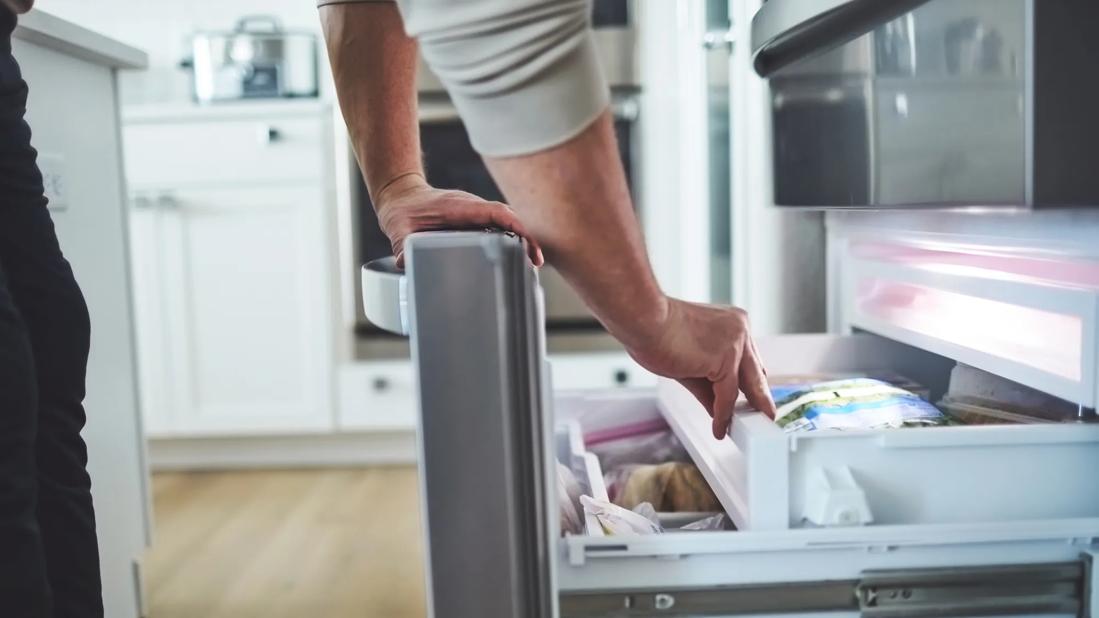Extended outages lasting more than four hours can make food in your fridge unsafe to eat

Odds are, you’re going to experience a power outage at some point in the coming months. If you’re lucky, your lights will quickly flicker back to life — but we all know that’s not always the case.
Advertisement
Cleveland Clinic is a non-profit academic medical center. Advertising on our site helps support our mission. We do not endorse non-Cleveland Clinic products or services. Policy
So, if an outage stretches for hours, when do the good eats in your fridge turn bad? Let’s get an answer from registered dietitian Beth Czerwony, RD, LD, to avoid potential food poisoning.
The clock starts ticking on your refrigerated food when the power goes out, says Czerwony. In general, you can expect a closed refrigerator to keep food safe for about four hours during an outage.
Now, if you open the fridge to grab a snack during the outage … well, you just let cold air out and warm air in to shorten the survival time of perishable items.
“It’s important to keep the fridge door shut to maintain the temperature inside,” she says.
Everything in your fridge typically chills at or just below 40 degrees Fahrenheit (4 degrees Celsius). Temperatures that climb above that level enter what’s ominously referred to as the “Danger Zone.”
Bacteria can grow quickly on perishable food kept at warmer temperatures. And eating spoiled food can lead to some serious tummy trouble.
While some foods deserve to get the heave-ho after four hours, other items in your fridge may be salvageable. (Good news, given that you probably just dropped serious dollars at the grocery store, right?)
Let’s go over what should stay or go.
Advertisement
If an outage extends past four hours, the following foods may be unsafe to eat and should be discarded:
The list of food you can safely keep and eat once the power comes back on includes:
Food in a fully stocked freezer can stay safe for up to 48 hours during a power outage, says Czerwony. If your freezer is half full, the contents remain safe for about 24 hours.
Again, it’s important to NOT OPEN the freezer door to let any of the cold air escape.
Frozen meat or meals can typically be refrozen if you see ice crystals on the packaging or if it still feels “refrigerator cold” to the touch when the outage ends. The quality of certain foods (such as frozen fruit or vegetables) may diminish with refreezing.
Most items should be discarded if the temperature in the freezer rises above 40 F (4 C) for more than two hours.
If the outage hits while you’re sleeping or away from home, you might not know how long the power has been out. If you’re unsure, check to see if any food feels lukewarm to the touch. (That’s a bad sign, by the way.)
Keeping a thermometer in your refrigerator may help you better determine whether food can be saved, suggests Czerwony. If the thermometer reads about 40 F (4 C), it’s best to open your trash can and start feeding it.
Now, nobody wants to throw out food, especially if we’re talking about pricey meats. But sometimes, that’s your safest option to avoid food poisoning and the unwelcome symptoms that come with it.
Advertisement
“When in doubt, throw it out,” advises Czerwony. “A sketchy slice of ham isn’t worth the risk.”
Advertisement

Sign up for our Health Essentials emails for expert guidance on nutrition, fitness, sleep, skin care and more.
Learn more about our editorial process.
Advertisement

Leftovers can be kept in the fridge for three to four days or frozen for three to four months

Ultimately, rice is safe to eat, but the type, where it’s grown and how you cook it may be factors to consider

Washing your hands, thoroughly cleaning kitchen tools and preparing meat separately can reduce the risk of foodborne illness

Make your home a no-fly zone by cleaning your drains, refrigerating your produce and DIYing a fruit fly trap

Microwaves use non-ionizing radiation and haven’t been shown to cause cancer — follow food safety practices and use microwave-safe containers

Once perishable food hits the table, it’s typically good for about two hours

Color, texture, smell and expiration date all hold important clues

Warning: A popular TikTok hack to extend the life of avocados could lead to food poisoning

Even small moments of time outdoors can help reduce stress, boost mood and restore a sense of calm

A correct prescription helps your eyes see clearly — but as natural changes occur, you may need stronger or different eyeglasses

Both are medical emergencies, but they are very distinct events with different causes